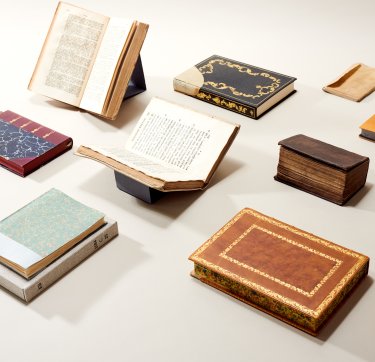FAQ about the Strategy for the formation of the National Library collection 2024-2030
Why is the KB releasing a new 'strategy for the formation of the national library collection' and what are the differences compared to the former collection strategy?
It is important for the KB to renew its collection strategy every few years to remain in line with the constantly changing publishing culture. The digitisation of society over recent years has led to enormous growth in the number of online publications. That is why we think it is important to broaden the definition of 'a publication' in this collection strategy beyond the 'newspapers, books and periodicals' that the KB has traditionally focused on. We want to be a representative reflection of Dutch publishing culture, which is why we now also explicitly consider online publication (such as websites, blogs and social media posts) as part of our collecting remit. This is how we ensure that all the different voices in today’s publishing culture are reflected in the national library collection.
The new collection strategy states that the KB ‘looks after the published, written word from and about the Netherlands’ and that it wants to reflect Dutch publishing culture. Is that possible if the KB prefers to include the digital edition of a title rather than the hard copy?
The broadening of the definition of what constitutes a publication, and the broadening of what we consider to be our collecting remit, actually allow us to better represent Dutch publishing culture. Our guiding principle is the goal of collecting one edition of all publications in or about the Netherlands, and to keep this available as heritage for future generations. We have made arrangements with the CB and publishers to automate the delivery of both physical and digital books. The agreement regarding this 'General Collection' is that we will only accept a hard copy of a book if we have not been supplied with a digital copy. We make exceptions to this rule for children's books, art books, poetry and for all publications that fall under the ‘Special Collection’ criteria. We continue to collect the hard copies of those books and publications. By collecting digitally where possible and physically where it makes a difference, we preserve the proper representativeness of Dutch publishing culture. This ensures that research can be done on both the content and materiality of publications.
Why is the KB abandoning the principle of completeness? Surely it is the job of the national library to preserve everything ever written in or about the Netherlands?
The number of formats in which publications appear has enormously increased over recent years and includes things like e-books, web texts and social media posts. We now collectively publish more online than we ever did physically. That is why we wanted to broaden our collection profile, which means that 'collecting everything of everything' is no longer a tenable strategy. As the KB follows the expansion of the digital publishing culture, we also have to innovate the way we work. However, our people and resources are not inexhaustible. Because the national library is committed to providing the broadest possible reflection of Dutch society and publishing culture, we prefer to preserve one type of expression of a publication rather than many different formats of one publication.
Why doesn't the Netherlands have a legal deposit requirement? Wouldn't the KB collection be more complete with a statutory deposit scheme in which a copy of every publication is automatically sent to the KB?
We recently published this article on the KB’s collection history and the Depository of Dutch Publications as we have known it since 1974. While the Netherlands has a 'voluntary deposit' system and other countries often have a mandatory legal deposit requirement, there are advantages and disadvantages to both situations. However, having a legal deposit requirement does not necessarily mean a higher coverage ratio of publications. For example, the KB has made agreements with publishers and the CB that provide for automated inclusion of books in our repository. We also continue to come to new agreements with publishers and make proactive efforts to acquire titles so that the coverage ratio remains as high as possible.
Why did the KB practise selective collecting in the past, leading to gaps in the collection?
Ever since its founding in 1798, the KB’s goal has been to collect all written national heritage but this was done rather randomly for a variety of reasons. The KB's collection development originally focused on the humanities, with an emphasis on Dutch language, culture, history and literature. The KB had academic researchers as its primary target audience, so popular genres such as thrillers, detective novels and comic books were collected less. Publications by women and migrants were also considered to have less academic or cultural-historical value. We are making efforts to actively fill these gaps in the collection retrospectively.
What is the KB doing to complete missing publications?
Actively adding missing publications is called retrospective collecting. Our collection specialists work on this by looking for publications missing from our collection and acquiring them whenever possible. The new principle by which we also want to structurally store online publications contributes greatly to the polyphony of the National Library collection. We are also currently developing a 'Roadmap of Multivocality' with a targeted approach to enrich the KB collection with more voices of authors from our publishing past, present and future.
How does the KB prevent books it does not yet have from being lost in other collections? (e.g. in library collections undergoing remediation)
No one can prevent books from being lost, but the KB is part of several national and international networks all working to safeguard written heritage. Based on our responsibility to use limited resources as efficiently as possible, we coordinate the development of our collection with other Dutch heritage institutions and libraries. By working together, we form a 'national collection' in which overlap is avoided and gaps are identified. Under certain conditions, we sometimes also take over collections; we have a donations coordinator who reviews those requests. (See: Donations to the KB). Together with international partners we collaborate on mapping which national publications are abroad and how to make them findable and usable (e.g. digitally).
What are the KB's priorities regarding the digitisation of newspapers, books and periodicals?
The new collection strategy shifts a number of emphases with regard to digitising Dutch book production, newspapers and periodicals. With the Metamorfoze programme, the KB will continue to focus on the digitisation of written heritage over the coming years, also for other institutions. However, we are broadening the scope this work, and dropping the 1840-1950 year limits. We will now not only focus on hard copies but also on born digital material and put greater emphasis on digital access to this material. We will actively focus on the gaps in the digital collections of books, newspapers and periodicals.
Why is it important to make datasets of digitised publications also available for machines?
If you want collections to be easily found and used digitally, it is important that they are also easy to find for search engines, for example. Sharing datasets of digitised written heritage enables people and machines to (for example) search texts integrally and on a large scale. The KB is happy to facilitate these new types of research, also called Text and Data Mining (TDM).
Why will the KB possibly also stop storing hard copies of newspapers and periodicals in the future?
The KB now mainly collects the hard copies of newspapers and periodicals, as access to recent digital editions by KB members may violate copyright law. Setting up a fully-fledged digital stream of these publications will require further agreements with publishers.
How does the KB prevent the new selection criteria in this collection strategy from creating future gaps?
Those who collect have to make choices. This applies to all collections, everywhere. Choices, in turn, create gaps. We believe that striving for a representative reflection of the Dutch publishing culture is the strategy to provide future users with a rich National Library collection. But we cannot rule out the possibility that the librarians of the future may want to make additions to what we currently collect, just as we are now trying to fill in the gaps of the past.
When will there be a new law allowing the KB to store all Dutch websites?
That remains unclear. In 2021, the Instituut voor Informatierecht (Institute for Information Law) released a report that highlights the importance of web archiving and suggests several options for making it legally possible. The KB then looked at what resources would be needed to provide a national domain crawl (storing all websites belonging to the Dutch web domain). The Dutch Ministry of Education, Culture and Science is still considering what change in the law could be applied to enable the storage of the Dutch web domain.
I cannot find all published titles in the KB collection. Why is that?
Not all books that come into the KB's possession are immediately visible in the catalogue on the KB website. Processing new titles takes some time, as publications have to be described and metadata have to be added to our systems. Unfortunately, the KB has experienced some delays in this work, partly due to the lockdowns, the establishment of new content streams and the implementation of a new catalogue system. We obviously remain committed to catching up with this.


